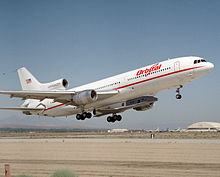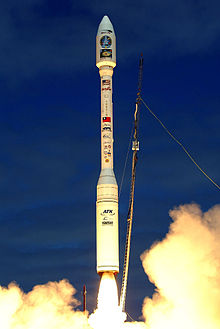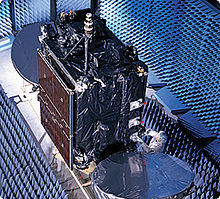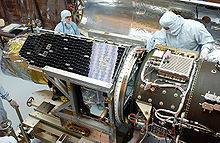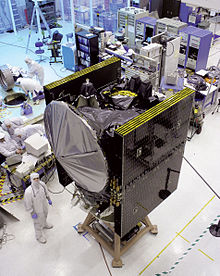- Orbital Sciences Corporation
-
Orbital Sciences Corporation 
Type Public (NYSE: ORB) Industry Aerospace, defense Founded Vienna, Virginia, U.S. (1982) Founder(s) David W. Thompson
Bruce W. Ferguson
Scott L. WebsterHeadquarters Dulles, Virginia, United States Area served Global Key people David W. Thompson,
Chairman and CEO
J.R. Thompson,
Vice Chairman, President, and COO
Garrett E. Pierce,
Vice Chairman and CFOProducts Space Launch Vehicles, Missile Defense Systems, Satellites and Related Systems, Advanced Space Systems, Space Technical Services Revenue  US$1.13 billion (FY 2009)[1]
US$1.13 billion (FY 2009)[1]Operating income  US$52.29 million (FY 2009)[1]
US$52.29 million (FY 2009)[1]Net income  US$36.61 million (FY 2009)[1]
US$36.61 million (FY 2009)[1]Total assets  US$929.48 million (FY 2009)[1]
US$929.48 million (FY 2009)[1]Total equity  US$502.46 million (FY 2009)[1]
US$502.46 million (FY 2009)[1]Employees 3,675 (April, 2010) Divisions Launch Systems Group
Group
Space Systems Group
Advanced Programs
Technical Services DivisionWebsite www.orbital.com Orbital Sciences Corporation (OSC, though commonly referred to as Orbital) is an American company which specializes in the manufacturing and launch of satellites. Its Launch Systems Group is heavily involved with missile defense launch systems. Orbital formerly owned ORBIMAGE (now GeoEye) and the Magellan line of GPS receivers, though they are now divested (the latter to Thales). Orbital's NYSE ticker symbol is ORB. It has its headquarters in the Dulles area of unincorporated Loudoun County, Virginia, United States.[2]
Orbital Sciences since inception has built 569 launch vehicles with 82 more to be delivered by 2015. 174 satellites have been built by the company since 1982 with 24 more to be delivered by 2015. Orbital has a 40% share of the interceptor market, 55% share of the small communications satellite market, and a 60% share of the small launch vehicles market. The company is expanding into the medium size launch vehicles and satellites market with the development of the Taurus II rocket and the acquisition of the General Dynamics Advanced Information System Satellite division[3].[verification needed][4]
Contents
History
Orbital was founded in 1982 by David Thompson, Bruce Ferguson and Scott Webster.[5] In 1990, the company successfully carried out eight space missions, highlighted by the initial launch of the Pegasus rocket.[6] In 2006 Orbital conducted its 500th mission since the company’s founding.
In 1997 it spun off its space imaging division Orbital Space Imaging or ORBIMAGE (with Thompson then as chairman). It is now GeoEye.
On March 4, 2010 Orbital Sciences announced it was acquiring General Dynamics Advanced Information System's Satellite division, which was formerly Spectrum Astro. The purchase price was $55 million and the deal was closed on 2 April 2010.[7] Orbital Sciences stated the deal added nearly $70 million in revenue and slightly improved 2010 earnings, and expects the business to add approximately $100 in revenue in 2011.[8] Approximately 325 employees of the General Dynamics division and the Gilbert, AZ campus of the General Dynamics division were retained.[9]
In 2010, Orbital made a commercial proposal to NASA to develop a lifting-body spaceplane vehicle, about one-quarter the size of the Space Shuttle, in response to NASA's Commercial Crew Development phase 2 solicitation. The Vertical Takeoff, Horizontal Landing (VTHL) vehicle would be launched on a human-rated (upgraded) Atlas V rocket but would land on a runway.[10] The proposed spaceplane would have seated four astronauts.[11] NASA expected to make approximately $200 million of phase 2 awards by March 2011, for technology development projects that could last up to 14 months.[12] Failing to be selected for an CCDev phase 2 award by NASA, Orbital announced in April 2011 that they will likely wind down their efforts to develop a commercial crew vehicle.[13]
Business Groups
Space Systems Group (SSG)
Orbital is a provider of small- to medium-class satellites. Since the company's founding in 1982, Orbital has delivered over 110 spacecraft to commercial, military and civil customers worldwide. To date, these spacecraft have amassed a total of nearly 630 years of on-orbit operations.[14]
Launch Systems Group (LSG)
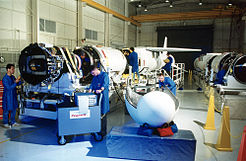 The Pegasus launch vehicle in its final assembly stage. A Pegasus rocket was put on display in the Udvar-Hazy Center of the National Air and Space Museum in 2004.
The Pegasus launch vehicle in its final assembly stage. A Pegasus rocket was put on display in the Udvar-Hazy Center of the National Air and Space Museum in 2004.
Orbital's space launch vehicles primarily focus on boosting small payloads to orbit. The Pegasus rocket is launched from the company's L-1011 carrier aircraft, Stargazer and has proven to be the industry's small space launch workhorse, having conducted 40 missions from six different launch sites worldwide since 1990. The Taurus and Minotaur ground-launched rockets combine Pegasus upper stages with either government-supplied or commercially available first-stage rocket motors to boost larger payloads to orbit. Minotaur IV is the newest addition to Orbital's line of space boosters and combines decommissioned Peacekeeper rocket motors with Orbital avionics and fairings, the Minotaur IV is only available to launch U.S. Government sponsored payloads.[15]
On March 4, 2011 the NASA Glory atmospheric research mission satellite was lost due to a mechanical failure on an Orbital built Taurus XL rocket. This failure follows the earlier loss on February 24, 2009 of the Orbiting Carbon Observatory due to a similar failure on a Taurus XL rocket. The total loss to NASA for these to failures is estimated to be nearly $700 million.[16] Still, NASA has expressed confidence in Orbital as a cargo provider to the International Space Station.[17]
Orbital is also a provider of suborbital launch vehicles for the nation's missile defense systems. In the last 10 years it has conducted nearly 50 launches for the U.S. Missile Defense Agency (MDA), the Air Force, the Army and Navy to develop, test and enhance U.S. missile defense systems.[18]
In November 2010, Orbital was selected by NASA for consideration for potential contract awards for heavy lift launch vehicle system concepts, and propulsion technologies.[19]
Advanced Programs Group (APG)
Orbital’s Advanced Programs Group focuses on developing new technologies for human spaceflight, commercial transportation, aeronautical research and space transportation.[20]
In support of human spaceflight, Orbital is developing a new medium-lift rocket, Taurus II, and a spacecraft, Cygnus spacecraft, which will provide supplies to occupants of the International Space Station. These programs are being developed under NASA’s Commercial Orbital Transportation Services (COTS), for which Orbital was selected as a partner in 2008. The company will provide resupply services to the ISS under NASA’s Commercial Resupply Services (CRS) program. Operational flights are scheduled to begin in 2012 from the new Mid-Atlantic Regional Spaceport at Wallops Island in Virginia.
Technical Services Division (TSD)
Orbital provides engineering, production and technical management personnel primarily for space-related science and defense programs. Typically, it supplies specialized personnel — engineers, scientists, technicians and other professionals — with specific knowledge in the areas that the customer is pursuing. The Orbital employees often work with the customers' technical staff at their facilities.[21]
Primary Facility Locations
- Dulles, Virginia
- Chandler, Arizona
- Orange County, California
- Beltsville, Maryland
- Greenbelt, Maryland
- Vandenberg Air Force Base, California
- Wallops Flight Facility, Virginia (under construction)
- Gilbert, Arizona
Orbital products
International Space Station resupply
- Commercial Orbital Transportation Services (COTS) Demonstration resupply mission to ISS: debut of Cygnus spacecraft and Taurus II launch vehicle
- Commercial Resupply Services (CRS) $1.9 Billion NASA contract for 8 Cygnus/Taurus II resupply missions to the ISS[22]
NASA Constellation program
Satellite launch vehicles
- Minotaur Solid fuel Satellite launcher Rocket
- Pegasus Winged space booster component of an expandable launch system
- Taurus Four stage, solid fuel launch vehicle
- OSP-2 Minotaur IV, a satellite launching version of the LG-118A Peacekeeper
- Minotaur V Five stage satellite launching version of the LG-118A Peacekeeper
- Taurus II Three stages kerosene/oxygen - solid - hypergolic rocket (in development)
Experimental vehicles
- X-34 reusable launch vehicle demonstrator
- DART Rendezvous Vehicle
- Hyper-X
- Orbital Space Plane
Missile defense systems and ballistic target vehicles
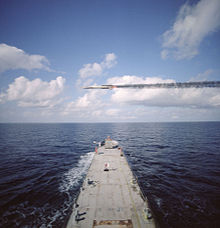 The GQM-163A Coyote Supersonic Sea-Skimming Target (SSST) flies over the bow of the U.S. Navy observation ship during a routine test
The GQM-163A Coyote Supersonic Sea-Skimming Target (SSST) flies over the bow of the U.S. Navy observation ship during a routine test
- Ground-Based Midcourse Defense (GMD) Orbital Boost Vehicle (OBV) for the United States Missile Defense Agency (MDA)
- Kinetic Energy Interceptor (KEI)
- GQM-163A Coyote
- Target Test Vehicle (TTV)
- Minotaur II
- Minotaur III
Geostationary satellites
- STAR 2 platform
- At its Dulles, Virginia plant Orbital builds medium-sized spacecraft based on the company's STAR 2 platform. Both payloads of a September 2007 Ariane 5 launch — Optus D2 and Intelsat 11 were built on the STAR 2 platform.[23]
- Optus D1
- Optus D2
- Optus D3
- Intelsat 11
- Horizons-2
- Thor 5
- AMC-21
- MEASAT-3a
- NSS-9
- Intelsat-15
- Intelsat-16
- [[Intelsat|Intelsat-18
- [[Korea Telecom|Koreasat-6
- Intelsat-16
- New Dawn
- [[SES Americom|AMC-5R
- [[SES Americom|FM-1
- [[SES Americom|FM-2
- Intelsat-23 (in production)
Low Earth orbit satellites
- GALEX
- SORCE
- DART
- AIM
- OCO (launch failure)
- OCO2 (in development)
- GLORY (launch failure)
- ORBCOMM Fleet
- FORMOSAT-3/COSMIC
- NuSTAR (in development)
- OrbView-3
- Space Technology 8 (ST8) (in development)
- GEMS (in development)
- LDCM (in production)
Planetary probes
Client countries
- Australia
- Azerbaijan
- France
- Indonesia
- Japan
- South Korea
- Malaysia
- Netherlands
- Norway
- Pakistan
- Philippines
- Taiwan
- United States
Launch Sites
- Vandenberg Air Force Base (VAFB) in California
- Cape Canaveral Air Force Station (CCAS) in Florida
- Wallops Flight Facility (WFF) in Virginia
- Kodiak Launch Complex in Alaska
- Edwards Air Force Base in California
- Kwajalein Atoll in the Marshall Islands
- Canary Islands in Spain
- Pacific Missile Range Facility (PMRF) in Hawaii
Partnerships
- Lockheed Martin
- Alliant Techsystems (ATK)
- Aerojet
- Yuzhnoye Design Bureau
- Yuzhmash
- Thales Alenia Space
- Mid-Atlantic Regional Spaceport
See also
References
- ^ a b c d e Orbital Sciences (ORA) annual SEC income statement filing via Wikinvest
- ^ "Contact Information." Orbital Sciences Corporation. Retrieved on September 25, 2009.
- ^ "Orbital Announces the Closing of its Acquisition of General Dynamics' Satellite Development and Manufacturing Business". April 2, 2010. http://www.orbital.com/NewsInfo/release.asp?prid=725.
- ^ "An Introduction to Orbital Sciences Corporation". Orbital. June 2010. http://phx.corporate-ir.net/External.File?item=UGFyZW50SUQ9NDg5Mzl8Q2hpbGRJRD0tMXxUeXBlPTM=&t=1. Retrieved 1 December 2010.
- ^ http://www.orbital.com/About/Milestones/80_89/
- ^ http://www.orbital.com/About/Milestones/90_99/
- ^ http://www.your-story.org/orbital-announces-the-closing-of-its-acquisition-of-general-dynamics%E2%80%99-satellite-development-and-manufacturing-business-162257/ Press Release announcement
- ^ "Q4 2010 Orbital Sciences Corporation Earnings Conference Call". February 17, 2011. http://phx.corporate-ir.net/External.File?item=UGFyZW50SUQ9ODIwMzd8Q2hpbGRJRD0tMXxUeXBlPTM=&t=1.
- ^ http://www.marketwatch.com/story/orbital-to-acquire-general-dynamics-satellite-development-and-manufacturing-business-2010-03-04 Market Watch announcement
- ^ Orbital Proposes Spaceplan for Astronauts, Wall Street Journal, 2010-12-14, accessed 2010-12-15.
- ^ Orbital Submits Proposal for NASA's Commercial Crew Development Program, Orbital Press Release, 2010-12-14, accessed 2010-12-16.
- ^ "NASA Seeks More Proposals On Commercial Crew Development". press release 10-277. NASA. October 25, 2010. http://www.nasa.gov/home/hqnews/2010/oct/HQ_10-277_CCDev.html.
- ^ Orbital may wind down its commercial crew effort "Orbital may wind down its commercial crew effort". NewSpace Journal. 2011-04-22. http://www.newspacejournal.com/2011/04/22/orbital-may-wind-down-its-commercial-crew-effort/ Orbital may wind down its commercial crew effort. Retrieved 2011-04-25. "CEO Dave Thompson said ... "I don’t, at this time, anticipate that we’ll continue to pursue our own project in that race. We’ll watch it and if an opportunity develops we may reconsider. But at this point, I would not anticipate a lot of activity on our part in the commercial crew market.""
- ^ "Satellites & Space Systems". Orbital. 2008-12-23. http://www.orbital.com/SatellitesSpace/.
- ^ "Space Launch Vehicles". Orbital. 2008-12-23. http://www.orbital.com/SpaceLaunch/.
- ^ http://news.cnet.com/8301-19514_3-20039222-239.html
- ^ http://space.flatoday.net/2011/03/nasa-names-glory-investigation-board.html
- ^ "Missile Defense Systems". Orbital. 2008-12-23. http://www.orbital.com/MissileDefense/.
- ^ "NASA Selects Companies for Heavy-Lift Vehicle Studies". NASA. http://www.nasa.gov/home/hqnews/2010/nov/HQ_10-292_Heavy_Lift.html. Retrieved 8 November 2010.
- ^ "Advanced Space Systems". Orbital. 2008-12-23. http://www.orbital.com/AdvancedSpace/.
- ^ "Space Technical Services". Orbital. 2008-12-23. http://www.orbital.com/SpaceTechnicalServices/.
- ^ "SpaceX and Orbital Win Huge CRS Contract from NASA". NASA SpaceFlight. 2008-12-23. http://www.nasaspaceflight.com/2008/12/spacex-and-orbital-win-huge-crs-contract-from-nasa/.
- ^ "Arianespace boosts Intelsat 11 and Optus D2 into orbit". Arianespace. 2007-10-05. http://www.arianespace.com/site/news/releases/presrel07_10_05.html.
External links
Space tourism Companies Armadillo Aerospace · Bigelow Aerospace · Blue Origin · EADS Astrium · Mojave Aerospace Ventures · Orbital Sciences Corporation · RocketShip Tours · Scaled Composites · Space Adventures · SpaceX · Virgin Galactic · XCOR Aerospace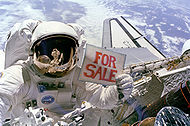
Organizations Successful spacecraft Living in space Space competitions Categories:- Companies listed on the New York Stock Exchange
- Aerospace companies of the United States
- Commercial launch service providers
- Companies based in Dulles, Virginia
- Private spaceflight companies
- Spacecraft manufacturers
Wikimedia Foundation. 2010.

